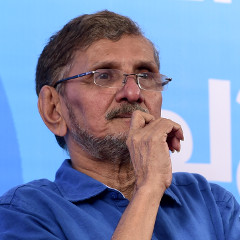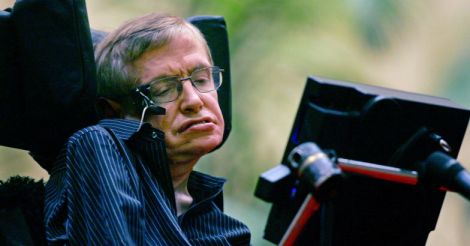“Can you hear me?” a voice, even and mechanical, sounding like an ET in sci-fi movies, asked from the stage. “Yes” the audience packed into every square inch of the Siri Fort Auditorium in New Delhi yelled back in response.
Hunched in a wheelchair, rummaging through a computer screen fitted on the wheelchair, Stephen Hawking spoke to them through a voice synthesiser. We managed to get seats only because we reached the auditorium early on that sunny January afternoon in 2001.
Click to see an interactive timeline of Stephen Hawking's life
The whole of Delhi was there. Many faces I could recognise came from non-science background like me. To us, Hawking represented nothing but the pinnacle of human will. The disease that caught up with him in his early youth was progressively wasting his body. What we saw on stage was just a brain, burning bright, some fingers that barely moved and a contorted face that seemed to carry traces of a smile.
Few years later he lost the mobility of his fingers too but he still communicated through a voice synthesiser which responded to the movement of his cheek muscles.
In Delhi, he spoke on ‘Predicting the future -- from astrology to black holes.' His sheer pleasantness surprised us. He was not a sickly person but a rock star who let the crowd sway to his speech.
Hawking laced his speech with humour. He flirted on the naughty side, he recounted his experiences in Paris, where he was giving a seminar on black holes. He said that black holes were not so black after all. The speech fell flat, the French were not amused. Apparently, they thought black hole was an obscenity!
Hawking said wryly that they would have given him a Nobel Prize had he discovered smaller and more powerful black holes. He never got the Nobel Prize.
Another memory from that meeting is the large presence of differently abled people among the audience. They were equally cheerful.
A differently abled friend told me after the death of Hawking how the high-profile visit changed his life. He was a university student in Delhi when Hawking visited the city. The authorities built a ramp in the Red Fort for the celebrity visitor to move about. That ramp made the Red Fort accessible to my friend.
Die effortlessly
T Ramalingam Pillai’s English-Malayalam dictionary translates euthanasia into "anayasa maranam” (effortless death). That goes well with the Greek roots of the English word. Dayavadham (mercy killing), the word that gained currency in Malayalam as a translation of passive euthanasia after the Supreme Court judgment, is mostly reserved for putting to sleep suffering pets.
Since "dayavadham" for euthanasia has already become common usage in Malayalam, it seems practical if we invest the word with another meaning, to die effortlessly, and take forward the debate.
By sheer coincidence, the talk of euthanasia brings me back to Hawking. I am reminded of his first wife Jane’s writing on his 1985 visit to the CERN lab in Switzerland. Hawking was nearing 43; he had been diagnosed with ALS for nearly two decades. His body was almost atrophied. A sudden bout of pneumonia aggravated his condition. The doctors thought it was the end of the road and asked Jane’s permission to pull off the life support. She did not agree.
The doctors conducted a tracheotomy on him and that was the end of whatever little speech left in him. He lived, thereafter, for more than three decades. He wrote his famous ‘A Brief History of Time’ (1988) in that period. I am not sure whether we can call it a miracle. We know, either personally or by word of mouth, of many instances of survival by people whose plugs were about to be pulled.
The Supreme Court order once again underlines the endless complexities of life and death. It spawns many questions: would the life insurance policies, for instance, need to be changed to equate euthanasia with natural death? Would this order discourage the research and development of life-saving therapy?
The judges knew they had just triggered an endless stream of thoughts. That is why they fell back on the rarely used Article 142 to deliver their judgment, which
would make to take the place of a law until Parliament passes a bill on the subject. In other words, the Supreme Court has just opened a public debate before legislation.
Scorpion kick
Kerala minister G Sudhakaran said the world-famous wink of the actress Priya Varrier was no big deal. Anyone could do it with a bit of training, he said.
Since the actress has already landed a job in Bollywood, the minister could think of opening training schools for the art.
Read more: Columns | Straight Talk

























 In Delhi, Hawking spoke on ‘Predicting the future -- from astrology to black holes.'
In Delhi, Hawking spoke on ‘Predicting the future -- from astrology to black holes.' 


